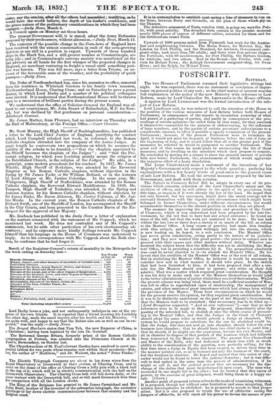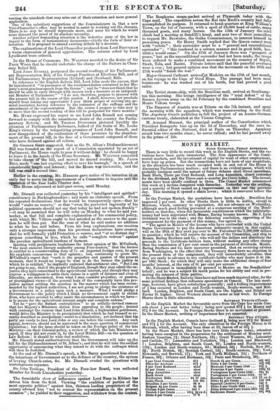POSTSCRIPT.
SATURDAY.
The two Houses of Parliament resumed. their legislative sittings last night. As was expected,. there was no statement or revelation of impor- tance on general polities of any sort ; so the chief matter of interest was the full explanation of the policy of the new Ministry with. reference to Law Reform, made by Lord Chancellor ST. LEONARD'S' in the House ofPeers.
A motion by Lord LYNDHURST was the formal introduction of the sub- ject of Law Reform. Lord Lyndhurst said, he was induced to call the attention of the- House to the position of the various measures of Law Reform before both. Houses of Parliament, in consequence of the reports in circulation yesterday of what had passed at a gathering of parties, and partly in consequence of the pro- ceedings of certain agitators—he called them by that name, for they assumed it themselves—assembled for the purpose of endeavouring, by the influence of large numbers, and by the parade of certain pecuniary subscriptions to a, considerable amount, to effect if possible a speedy termination of the present Parliament; because, if the present Parliament were to terminate in April, it would not meet for despatch of business before the end of June or the beginning of July, and it would follow that all or the greater part of the measures he referred to would be postponed to another Parliament. The great evil of this course he made plain by enumerating the list of those measures, and by dwelling on the mischiefs which they propose to remedy. He concluded by moving for a return to show the unusual amount of private bills now before Parliament, the', abandonment of which would aggravate the injurious effect of a hasty dissolution. The Loan CHANCELLOR made a statement of the intentions of her Majesty's Government with respect to the whole question ; prefacing his explanations with a few hearty words of good omen to the general cause of safe Law Reform. He took the several measures proposed by the late Government, and dealt with them seriatim.
The Suitors in Chancery Relief Bill he adopts in every one of its pro- visions which concerns reduction of the Lord Chancellor's eatery and the abolition of offices, and he will adhere to the spirit of its provisions, from this time, as much as if it were already the law of the land. He hoped that not only himself, but his successors, might have the moral courage not to surround themselves with the dignity and circumstance which might have belonged to former Chancellors, under different circumstances, but would accommodate themselves to the altered position in which they are plhced. The measure for improving the jurisdiction and procedure of the Court
of Chancery, which it was understood had been prepared by the late Go- vernment, he did: not find to have bad any actual existence ; he found no trace of the bill, but that the work yet remained to be done. He has had within the last two or three days a sketch of so much of the bill as relates to the Masters' Office. A long course of practice had made hint familiar with this subject, and he should willingly fall into the stream, which, is now leading us, ho hoped, to a safe conclusion. The Masters' Office had never given satisfaction, owing partly to the nature of itsjurisdic- tion • and they now wanted this great power—the power M compel men to proceed with their causes and other matters without delay. Whoever un- derstood the subject knew that the difficulty was not in abolishing the Mas- ters' Office, but in providing a substitute for it. The proposition abeolutely was—and ho never objected to it—to abolish the Masters' Office. He be- lieved that the abolition of the Masters' Office was at the root of all reform. But in abolishing•the Masters' Office, he believed it would be necessary to' consider how and in what manner it should take place. In the sketch that had been furnished to 'lino, it had been proposed that after a cer- tain day the Masters should' cease to operate, and retire on their full salariea. That was a matter which required great consideration: He thought it was his duty to make such use of the Masters themselves as would' tend to the better administration of justice whilst they reeciveditheir salaries. Whilst the present scheme was being tried, there must be a sufficient number- of Mas- ters left in office to superintend cases of receivership, the management of estates, and other matters of great importance which had always been within the province of the Master. Those were circumstances on which he would for the present reserve his opinion, for they required great consideration. But it was to be distinctly understood on the part of her Majesty's Government, that the Masters were to be abolished ; that no vacancy was to be filled up— [Lone' Brougham suggested,•" _And no new references "]—and that no new references were to be made to them. He proposed, immediately after the passing of the intended bill, to abolish at once the whole course of proceed- mg in the Masters' Office, and that the Judges in the Court of Chancery should adopt the same rules as would govern a Judge at chambers. The system he would propose to substitute for the one be abolished would be, that the Judge, who does not now go into chamber, should follow his own business into chamber; that he should have two chief clerks to assist him ; that he should, if he might use the expression, become his own Master, and sit in chamber to dispose of that portion of the business which had hitherto been transacted by the Master in chamber. The present Vice-Chancellors and Master of the Rolls, who had dedicated so much time with so much ability to the consideration of the question, were perfectly willing, for the first time-since a Judge in Equity had been created, to devote their time in the manner pointed out, so as to transact not only the business of the court, but the business in chamber. He hoped and trusted that this union' of cha- racter would. not be found to lower the judicial character ; but it WM Ilifilw cult to find united in the same man the powers of adratnietration, if he might so call it, and the judicial powers that are necessary for the dis- charge of the duties that must be performed in open court. The man who succeeded in one might fail in the other ; but he trusted that this union of powers, by the exercise of great diligence, would bring them to a happy re- sult. 'tCheers.) Another point of proposed reform refers to the mode of examining. witnesses. It is proposed, though not without some hesitation and some misgiving, that written interrogatories be abolished: he is prepared' to secede to that propo- sition. But it is also proposed to retain the use of affidavits: seeing the dangers of affidavits, he will• exert althis-powee to device the means of pre-
venting the mischiefs that may arise out of their retention and more general application.
One of the subsidiary suggestions of the Commissioners is, that a new Vice-Chancellor's office may be needed to assist in working out the changes. There is no step he should deprecate more, and none for which he would more demand the proof of its absolute necessity.
Another subject demanding attention is the defective state of the law in regard to the form of testamentary documents—chiefly the form of their at- testation. It is proposed to amend existing defects by a measure.
The explanations of the Lord Chancellor produced from Lord BROUGHAM a warm expression of general approbation. The returns asked by Lord Lyndhurst were ordered.
In the House of Commons, Mr. Wa.troix acceded to the desire of Sir PAGE WOOD that he should undertake the charge of the Suitors in Chan- cerp Bill. Lord JOHN RUSSELL postponed the second readings of his Parliament- ary Representation Bill, of his Corrupt Practices at Elections Bill, and of his Parliamentary Representation (Ireland) and (Scotland) Bills. In reference to the English Reform Bill, Lord John made the excuse, that he introduced it "in pursuance of the recommendation contained in her Ma- jesty's most gracious speech from the throne" ; and he "does not think that he should be able to carry through with success such a measure as an independ- ent Member of Parliament." "I do not, therefore, propose to proceed with the present bill in the course of this session. I shall, however, not preclude myself from taking any opportunity I may think proper of moving any ge- neral resolution having reference to the extension of the suffrage and the amendment of the representation. But the course I propose to take now is to move that the second reading of this bill be postponed for three months."
Mr. Hussz expressed his regret to see Lord John Russell not coming forward to comply with the unanimous desire of the country for Parlia- mentary Reform ; and Mr. Thomas DuNecarsc pictured forcibly the situation of Parliamentary Reformers, balked of the fruits of Mr. Locke King's victory by the temporizing promises of Lord John Russell, and now disappointed of the realization of those promises by the abandon- ment of the present bill, in the face of a Government composed of those who have declared against all reform.
Sir GEORGE Gm suggested, that as the St. Alban's Disfranchisement Bill was founded on the report of a Commission appointed by an act of Parliament, the House ought to pass it without delay : he should be happy to leave it in the hands of the Home Secretary. Yr. Wei roiz consented tolake charge of the bill, and moved its second reading. Mr. JACOB BELL made one last expiring effort to save his borough," in a speed' of considerable length and interest ; but the 'louse was inexorable, and the bill was read a second time.
Earlier in the evening, Mr. HRRRLIEJ gave notice of hisintention atm early day to move for the appointment of a Committee to inquire into the operation of the East India Charter Act.
The House adjourned at half-past seven, until Monday.



























 Previous page
Previous page